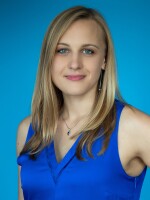
Sarah McCammon
Sarah McCammon is a National Correspondent covering the Mid-Atlantic and Southeast for NPR. Her work focuses on political, social and cultural divides in America, including abortion and reproductive rights, and the intersections of politics and religion. She's also a frequent guest host for NPR news magazines, podcasts and special coverage.
During the 2016 election cycle, she was NPR's lead political reporter assigned to the Donald Trump campaign. In that capacity, she was a regular on the NPR Politics Podcast and reported on the GOP primary, the rise of the Trump movement, divisions within the Republican Party over the future of the GOP and the role of religion in those debates.
Prior to joining NPR in 2015, McCammon reported for NPR Member stations in Georgia, Iowa and Nebraska, where she often hosted news magazines and talk shows. She's covered debates over oil pipelines in the Southeast and Midwest, agriculture in Nebraska, the rollout of the Affordable Care Act in Iowa and coastal environmental issues in Georgia.
McCammon began her journalism career as a newspaper reporter. She traces her interest in news back to childhood, when she would watch Sunday-morning political shows – recorded on the VCR during church – with her father on Sunday afternoons. In 1998, she spent a semester serving as a U.S. Senate Page.
She's been honored with numerous regional and national journalism awards, including the Atlanta Press Club's "Excellence in Broadcast Radio Reporting" award in 2015. She was part of a team of NPR journalists that received a first-place National Press Club award in 2019 for their coverage of the Pittsburgh synagogue attack.
McCammon is a native of Kansas City, Mo. She spent a semester studying at Oxford University in the U.K. while completing her undergraduate degree at Trinity College near Chicago.
-
White evangelical Christians are one of the most vaccine-hesitant groups in the United States. They're also among the largest religious groups, and their reluctance poses a public health challenge.
-
Leaders of a national Christian medical group write that Christians who gather now could appear not to "care that we may be contributing to others getting this illness because of our selfishness."
-
Americans woke up Friday to news that the president and first lady both had tested positive for the coronavirus. For many, reactions to the news fell along political lines.
-
Virginia's new COVIDWISE app is designed to alert users who may have been exposed to the coronavirus. The app relies on Bluetooth to notify people who may be at risk.
-
Six states will purchase 3 million rapid tests, and more states may join the consortium. Maryland, Virginia, Louisiana, Michigan, Ohio and Massachusetts want to stem a severe testing shortage.
-
For more than 40 years, 96.3 WHUR-FM broadcast Patrick Ellis's beloved and popular radio show Gospel Spirit Sunday mornings, filling the homes and cars of Washington, D.C., with the sound of church.
-
NPR science and education reporters answer questions submitted by listeners about the coming school year.
-
Through a partnership between state and local government, volunteers and city workers in Richmond, Va., are passing out PPE in at-risk neighborhoods.
-
A survey from the Guttmacher Institute finds that roughly one-third of women say they plan to delay having children, or have fewer, even as they are experiencing difficulty obtaining contraception.
-
Dr. Francis Collins says some candidates for a coronavirus vaccine will be ready to start large-scale human trials as early as next month. Scaling up production may start before tests are complete.




